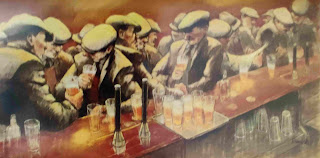There is quite a lot of unseen business in campaigning for real ale. I know many view the organisation as merely a glorified drinking club, which, of course, to an extent it is, but there is much valuable work done behind the scenes in the vital area of information gathering.
It is a priority of our Branch to update all the information for the large number of pubs we have in our area. That will mean that the drinking public that use WhatPub - CAMRA's national database of pubs - will have the most up-to-date information possible. While we try to keep everything as recent as we can, we do tend, naturally, to concentrate on the real ale pubs and clubs in our area. As a matter of interest, we look after approximately 350 pubs and clubs selling real ale across the boroughs of Rochdale, Oldham and Bury, with funnily enough the three areas all have a third or so each. Despite our 2100 members, as you can imagine the task of updating, falls to a few dedicated souls.
Thus, it was I found myself checking up on a long-standing real pub that had been reported as reverting to keg only. This is a pub that was first a beerhouse in 1860 and only became a fully fledged public house in May 1960. I rather think that in all the time it has sold beer, it has been sold in either bottled form, or more likely, as cask conditioned real ale. Alas, no more. A very amiable chat with the landlady revealed that she switched to keg on re-opening after Covid-19. I expressed surprise and with a pained expression she explained, that put simply, over the years and exacerbated by Covid, most of the bitter drinkers had died off and not been replaced. This had resulted in her having to throw away rather a lot of beer. Over time, with no improvement, she realised that she simply couldn't afford this, hence the move to the smooth version.
Looking around me in this neat little street corner local, there were, perhaps, a half dozen people around the bar at 5.30 p.m. All were drinking pints of lager. I sympathised with her predicament, and she assured me it was a very reluctant step and maybe one day, things will change. I replied that I hoped so and left. She was a smashing woman.
When you see so many closed little corner street pubs
that used to be thriving with locals, I for one, am glad that I lived
through an era that, while perhaps not the highest point of pub going, was at least
when they were, more or less, all seemingly doing well. These buzzy little boozers, alive with banter and familiarity, gave me a lot of
pleasure and thinking on, they still do, and I'd miss them if they all went in favour of some of the souless places they call "pubs" today.
So will they survive? It is a difficult question to answer, but looking at the evidence objectively, though some undoubtedly will, for many, it doesn't feel that way at all.
I'm not naming the pub. That would be unfair. A landlady that made a very good impression on me is doing her best for her business. That's exactly what she should be doing.
Yes, I do feel sentimental when I think back and when you look at the problem I outline and the people who still drink in them, you can't be optimistic. The title of this piece tells you that I think not only will many of these pubs be gone all too soon, but those that survey and write about them won't be, relatively speaking, that far behind.
The photo is from a picture we have in our kitchen. It seemed appropriate.































3 comments:
I don't much care to drink with my neighbours talking about boring green bins and cutting the grass.
Much prefer a town centre pub and a brewery tap where I can meet with my mates and talk serious crap.
Standard lager is of course now, and has been for some years, the default drink for those who just want a generic "pint of beer".
Of all CAMRA's achievements I think the preparation and maintenance of What Pub, for both cask and many keg pubs, is the greatest.
Post a Comment